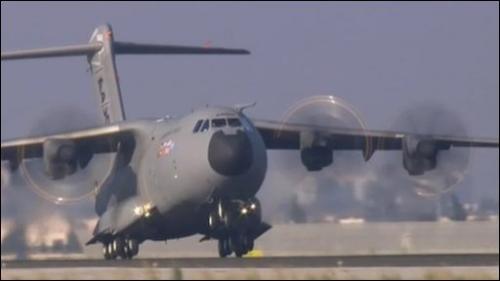
 From the International Institute For Strategic Studies: Following months of negotiations, seven European governments have reached a deal with EADS, the parent company of aircraft manufacturer Airbus, which should rescue the troubled A400M transport-aircraft project from failure. At a time when persistent gaps in European military capabilities are defying solutions, and with defence-budget cuts expected, many governments have begun to look more closely at multinational cooperation to generate improved capabilities at better value for the taxpayer. However, the A400M saga provides a sobering background to the debate. On 5 March, the seven customer nations – Belgium, France, Germany, Luxembourg, Spain, Turkey and the United Kingdom – agreed to increase the purchase price by €2 billion to €22bn and to provide €1.5bn in export finance in exchange for a share of sales revenues. The governments also waived their right to possible damages arising from delays to the project so far, and agreed to accelerate payments to Airbus ahead of deliveries. The project is four years late and substantially over budget. Although the deal will help EADS to reduce its losses on the A400M project, on 9 March it announced a charge of €1.8bn against profits to add to the €2.4bn loss provision it had already taken… However, the project is likely to harden the perception among industry executives that multinational collaboration often carries a time and cost premium. Airbus chief executive Tom Enders said in February 2010 that the proposed deal provided ‘the bare minimum of what we need to continue the programme’. The A400M would be a burden on the company’s finances and resources for years to come, he said… In spite of these problems, however, collaboration is likely to remain the only credible way of attaining large-scale capability development in Europe. National needs for improved capabilities for modern operations will persist, yet there is likely to be less money for defence. Governments will find it harder to justify the cost of purely national programmes, but will be reluctant to buy too many strategic assets ‘off the shelf’ from outside Europe. They want to preserve industrial jobs and technology, and also wish to limit their dependency for key military assets on outside suppliers. The travails of Europe’s transport-aircraft project underline the need for better risk management in future collaborative projects. (photo: BBC)
From the International Institute For Strategic Studies: Following months of negotiations, seven European governments have reached a deal with EADS, the parent company of aircraft manufacturer Airbus, which should rescue the troubled A400M transport-aircraft project from failure. At a time when persistent gaps in European military capabilities are defying solutions, and with defence-budget cuts expected, many governments have begun to look more closely at multinational cooperation to generate improved capabilities at better value for the taxpayer. However, the A400M saga provides a sobering background to the debate. On 5 March, the seven customer nations – Belgium, France, Germany, Luxembourg, Spain, Turkey and the United Kingdom – agreed to increase the purchase price by €2 billion to €22bn and to provide €1.5bn in export finance in exchange for a share of sales revenues. The governments also waived their right to possible damages arising from delays to the project so far, and agreed to accelerate payments to Airbus ahead of deliveries. The project is four years late and substantially over budget. Although the deal will help EADS to reduce its losses on the A400M project, on 9 March it announced a charge of €1.8bn against profits to add to the €2.4bn loss provision it had already taken… However, the project is likely to harden the perception among industry executives that multinational collaboration often carries a time and cost premium. Airbus chief executive Tom Enders said in February 2010 that the proposed deal provided ‘the bare minimum of what we need to continue the programme’. The A400M would be a burden on the company’s finances and resources for years to come, he said… In spite of these problems, however, collaboration is likely to remain the only credible way of attaining large-scale capability development in Europe. National needs for improved capabilities for modern operations will persist, yet there is likely to be less money for defence. Governments will find it harder to justify the cost of purely national programmes, but will be reluctant to buy too many strategic assets ‘off the shelf’ from outside Europe. They want to preserve industrial jobs and technology, and also wish to limit their dependency for key military assets on outside suppliers. The travails of Europe’s transport-aircraft project underline the need for better risk management in future collaborative projects. (photo: BBC)
Image: bbc_3_10_10.jpg
 From the International Institute For Strategic Studies: Following months of negotiations, seven European governments have reached a deal with EADS, the parent company of aircraft manufacturer Airbus, which should rescue the troubled A400M transport-aircraft project from failure. At a time when persistent gaps in European military capabilities are defying solutions, and with defence-budget cuts expected, many governments have begun to look more closely at multinational cooperation to generate improved capabilities at better value for the taxpayer. However, the A400M saga provides a sobering background to the debate. On 5 March, the seven customer nations –
From the International Institute For Strategic Studies: Following months of negotiations, seven European governments have reached a deal with EADS, the parent company of aircraft manufacturer Airbus, which should rescue the troubled A400M transport-aircraft project from failure. At a time when persistent gaps in European military capabilities are defying solutions, and with defence-budget cuts expected, many governments have begun to look more closely at multinational cooperation to generate improved capabilities at better value for the taxpayer. However, the A400M saga provides a sobering background to the debate. On 5 March, the seven customer nations – 